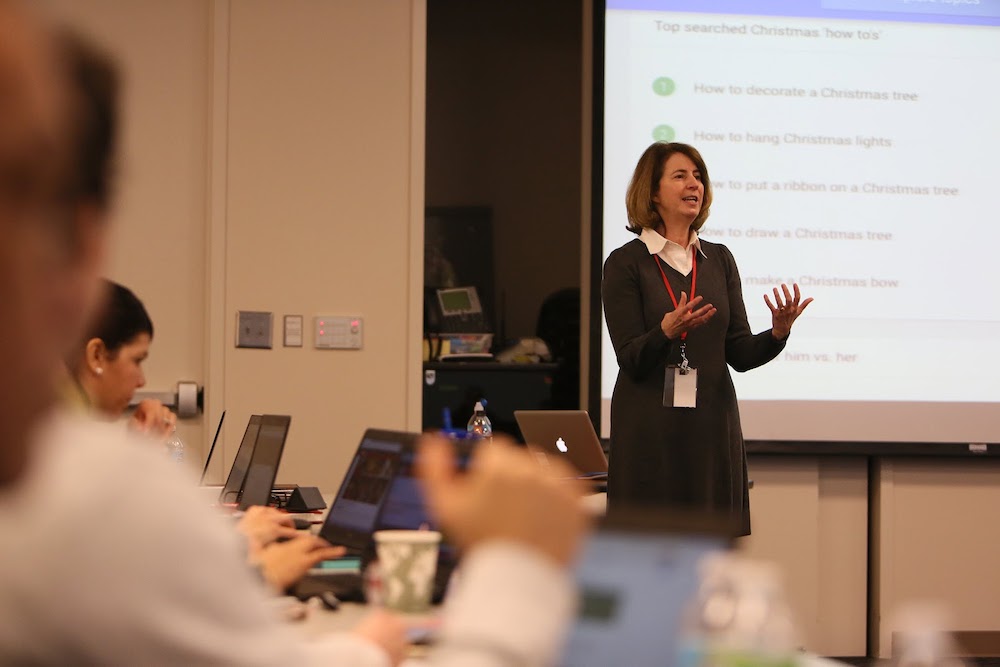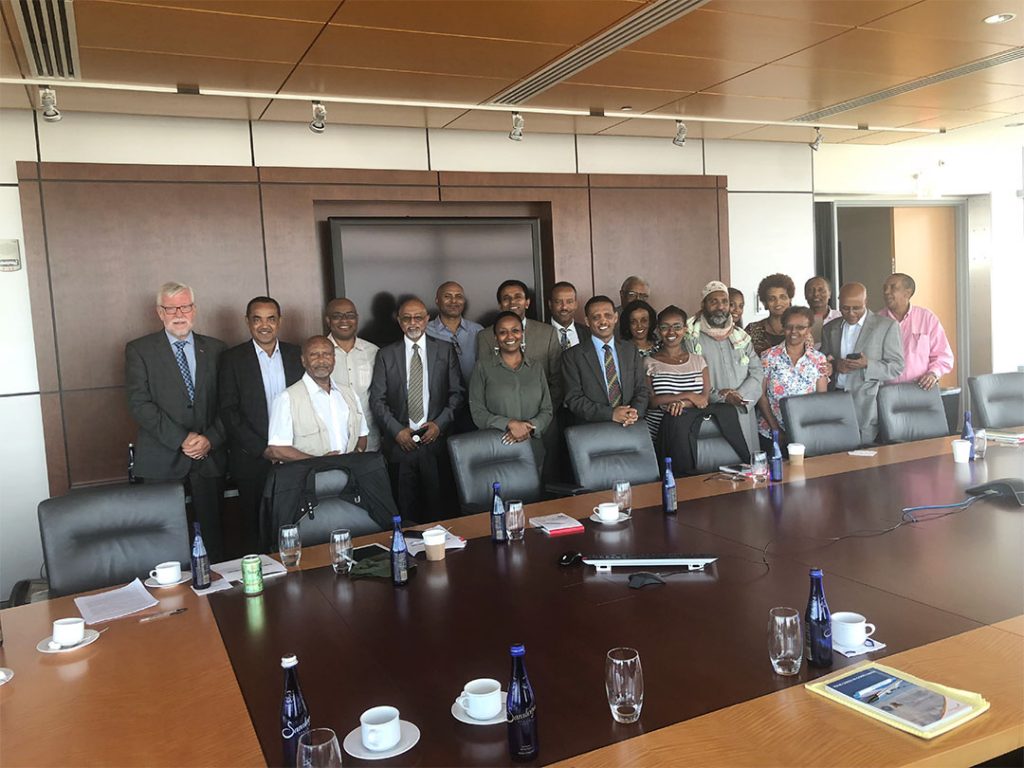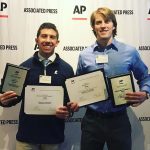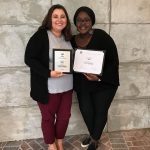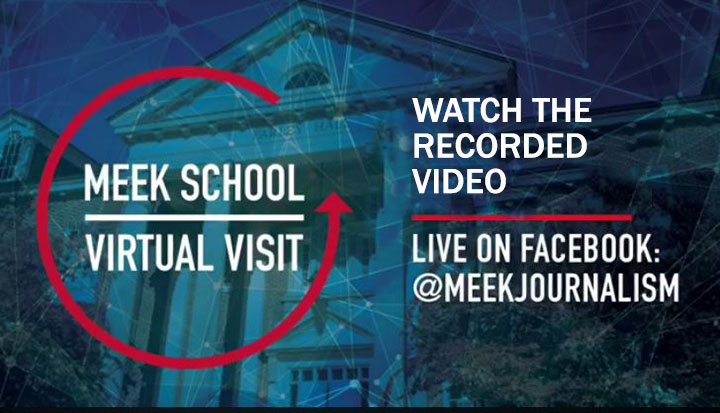
The School of Journalism and New Media offers two master’s degrees — one in journalism and one in integrated marketing communications. For the M.A. in Integrated Marketing Communications, students can choose from two delivery methods — residential or online. For the M.A. in Journalism, students can choose from two tracks — professional or academic.
M.A. in Journalism
It would be hard to imagine a better place for a journalist to study the art of storytelling at the graduate level than the campus of the University of Mississippi in Oxford, Mississippi. This fabled place that William Faulkner once called his personal “postage stamp of native soil” was indeed fertile soil for writers even before Faulkner began penning his stories and novels. Famed theater critic, journalist and novelist Stark Young lived and taught here at the turn of the last century. A long list of other writers and journalists—from legendary Harper’s editor Willie Morris to former Boston Globe correspondent and current faculty member Curtis Wilkie—have contributed to the mystique of this unique and special place where storytelling, whether written, spoken or seen in vivid images, is the very core of our mission as a journalism program.
Let us show you our state-of-the-art media center and see where many generations of top journalists have learned their craft, journalists such as former Freedom Forum Executive Director Charles Overby (also now on our faculty), Fox News anchor Shepard Smith, and author and top national Associated Press correspondent Jesse Holland. Our journalism graduate program features two distinct tracks—professional and academic. The professional master’s track offers courses in multimedia storytelling, documentary-making and long-form narrative writing that allow journalists to hone their craft to the highest level as they create lasting works of nonfiction, whether in print, online or on a screen. Students in the academic track can do this, too, but they will also take courses specifically designed to develop their research and theoretical skills, preparing them for a future in teaching as well as practicing journalism.
Preliminary Requirements: In addition to meeting graduate school admission requirements, applicants must submit a letter detailing their reasons for wishing to pursue the M.A. in journalism. Please send this letter directly to the School of Journalism and New Media (jnm@olemiss.edu). Applicants also should provide three letters of recommendation, including one addressing the applicant’s mass media experience, if applicable.
Applicants who do not have the equivalent of an undergraduate major in journalism may be required to take up to 12 hours of approved undergraduate journalism. This requirement may be waived for applicants who have significant work experience in the field of journalism.
Course Requirements for journalism tracks:
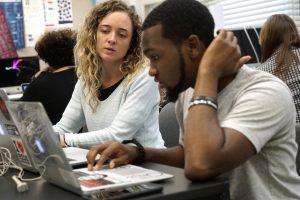 Academic: Students take a 30-semester-hour program of study, as follows: Jour 651, 652, 654, and 655; 12 hours of elective graduate course work either in the school or in an area of concentration outside the school; and 6 hours of Jour 697 to complete a thesis or thesis project. A thesis project must be a professional work in an appropriate medium equal in scope to a formal thesis, i.e., based on a formal proposal encompassing problem analysis, literature review, method statement, and bibliography. Both the thesis and the project require pre-approval of a written prospectus and an oral examination.
Academic: Students take a 30-semester-hour program of study, as follows: Jour 651, 652, 654, and 655; 12 hours of elective graduate course work either in the school or in an area of concentration outside the school; and 6 hours of Jour 697 to complete a thesis or thesis project. A thesis project must be a professional work in an appropriate medium equal in scope to a formal thesis, i.e., based on a formal proposal encompassing problem analysis, literature review, method statement, and bibliography. Both the thesis and the project require pre-approval of a written prospectus and an oral examination.
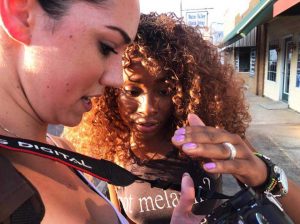 Professional: Students take a 30-semester-hour program of study, as follows: Jour 578, 590, 610, and 668; 12 hours of graduate-level electives (Jour or non-Jour); and 6 hours of Jour 697 to complete a thesis project. A thesis project must be a professional work in an appropriate medium equal in scope to a formal thesis, i.e., based on a formal proposal encompassing problem analysis, literature review, method statement, and bibliography. The project requires pre-approval of a written prospectus and an oral examination. Read more about the professional track here.
Professional: Students take a 30-semester-hour program of study, as follows: Jour 578, 590, 610, and 668; 12 hours of graduate-level electives (Jour or non-Jour); and 6 hours of Jour 697 to complete a thesis project. A thesis project must be a professional work in an appropriate medium equal in scope to a formal thesis, i.e., based on a formal proposal encompassing problem analysis, literature review, method statement, and bibliography. The project requires pre-approval of a written prospectus and an oral examination. Read more about the professional track here.
Graduate-level journalism courses:
501. MAGAZINE SERVICE JOURNALISM PUBLISHING. Conceptualization, market research, and production for a prototype and media kit for a service journalism magazine. Prerequisite: Jour 401 with a minimum grade of C. (3)
513. THE PRESS AND THE CHANGING SOUTH. An analysis of politics in the southern United States; examination of the role of the press in covering social issues; techniques used to inform the public about phenomena such as protest movements and their impact on social, political, and economic change. (3)
553. SERVICE JOURNALISM MANAGEMENT. Business aspects of magazine publication. Personnel management with emphasis on getting productivity and quality results from creative people. Prerequisite: Jour 401 with a minimum grade of C. (3)
571. COMMUNICATIONS LAW. (3)
572. HISTORY OF MASS MEDIA. (3)
573. MASS COMM, TECHNOLOGY, AND SOCIETY. The theory of mass communications technology in relation to media functions, responsibilities, and influence in society. (3)
574. PUBLIC OPINION AND THE MASS MEDIA. Effects of language, culture, and ideology. Communication in the formation and action of crowds, masses, and publics. Mass and personal persuasion and propaganda techniques. The diffusion of ideas. Community power structures. Public opinion measurement. (3)
575. MASS MEDIA ETHICS AND SOCIAL ISSUES. Formulation and discussion of professional ethics for journalists. Analysis of social forces affecting media performance. (3)
577. DEPTH REPORTING. Investigative and interpretative news writing; coverage of courts and legislative bodies; use of public records. Prerequisite: Jour 377 with a minimum grade of C or professional equivalent. (3)
578. MULTIMEDIA DOCUMENTARY REPORTING. Development of skills in conceiving, documenting, recording, and presenting information at broadcast standards as mini-documentaries in newscasts or as 30-minute and 60-minute documentary programs. Prerequisite: Jour 378 with a minimum grade of C or professional equivalent. (3)
580. TOPICS IN JOURNALISM. Perspectives on issues such as international mass communication, media and society, journalism ethics, diversity, etc. May be repeated for credit. Prerequisite: Instructor Approval Required. (3)
590: MULTIMEDIA STORYTELLING I. Students learn effective communications using graphical content, multimedia and interactive elements, creating a deliberate blend to add value to their storytelling. They acquire “hard” as well as “soft” skills needed in an unceasing news cycle. (3)
599. MEDIA PROBLEMS. Directed individual study or professional project. (May be repeated once for credit). Prerequisite: Consent of Department Chairperson Required. (1-3)
610. MULTIMEDIA STORYTELLING II. Expands on principles and techniques learned in Jour 590 as students marry new production skills to evolving news sensibility, producing potentially rules-bending, “out of the box” projects as selected areas of digital media are investigated in-depth. Prerequisite: Journalism 590. (3)
651. RESEARCH IN MASS COMMUNICATIONS. Introduction to basic procedures for gathering and evaluating information in mass communications. (3)
652. SEMINAR IN MASS COMMUNICATION THEORY. A survey of mass communication theory. (3)
653. PROBLEMS IN PUBLIC OPINION. Integration of theory with research methods for the production of a research project. (3)
654. SEMINAR IN COMMUNICATIONS LAW. Continuation of Communication Law with a concentration on specific areas of law in regard to the mass media. Prerequisite: Jour 371. (3)
655. SEMINAR IN HISTORY OF MASS MEDIA. Concentrated analysis and discussion of readings on media history. Prerequisite: Jour 301. (3)
664. JOURNALISM PRACTICES AND ETHICS. Analysis of the people who report the news within the context of a time period, an ethical issue, a specific media or any other construct that provides a cohesive whole. Issues covered will range from professional problems to the human, social, and other consequences of news, news practices and news technology on the people who report the news. (3)
668. NARRATIVE JOURNALISM. In-depth, non-fiction narrative writing course for print, radio and online, consisting of features, profiles, personal essays, travel writing and sports analysis. Considers the practice of narrative journalism within the context of American journalism-literary history and within the context of daily news, giving student writers an expansive platform to explore topics of interest. (3)
680. ADVANCED TOPICS IN JOURNALISM. Advanced perspectives on issues such as international mass communication, media and society, journalism ethics, diversity, communication theory, etc. May be repeated for credit. (3)
697. THESIS/THESIS PROJECT. No grade. (1-12)
M.A. in Integrated Marketing Communications
The M.S. in Integrated Marketing Communication is a tightly-focused professional master’s degree in which you can learn to create and manage coordinated communications that connect people and organizations. The curriculum blends theory, insight, and real-world application with a focus on the strategic integration of several media fields, including advertising, public relations, brand strategy, digital media, direct mail, content marketing, and research.
By taking an audience-centered approach, you can create consistent and effective messages that influence audience behavior. Graduates are prepared for leadership roles in advertising and PR agencies, corporate communication, media firms, nonprofit organizations, health promotion, political communication, sports marketing, or government.
To explore the residential and online degrees, please visit our program website or explore the course offerings below.
Graduate-level IMC Courses
IMC 501. PROFESSIONAL IMC SEMINAR. An intensive survey of basic IMC disciplines, plus an examination of “vertical” interactive organizational components that can influence marketing planning and processes, e.g., management’s mission, distribution, product development.
IMC 502. CONSUMER BEHAVIOR – UNDERSTANDING THE TARGET AUDIENCE. Applies insights and techniques of the social sciences to understand and predict how people will respond to messages, products and distribution channels. This course will focus on the practical application of ideas about consumer behavior to management decision making. Special attention will be given to recent developments in the discipline, including ideas about online behavior, the creation and manipulation of trends, the rise of marketing consciousness among consumers, the application of anthropological techniques to the study of consumer behavior, and others.
IMC 503. INSIGHTS AND MEASUREMENTS. Introduces specific methods for generating and acquiring information and data useful for IMC applications.
IMC 504. CREATIVE DEVELOPMENT AND DIRECTION. Covers – from start to finish — the many facets of IMC creative development and management, all of which are combinations of both right and left-brain thinking.
IMC 505. INTERNET AND MOBILE MEDIA: EVOLUTION OF THE DIGITAL SPACE. This course addresses the ways in which the Internet has changed marketing practice, combining all IMC practices specialized for the Internet platform, so that they can be studied as an integrated whole. The course includes online consumer behavior, the creation of the website as a business’s basic marketing platform – as catalog and collateral and retail platform and customer service provider. Search engine optimization, mobile marketing, online research and web videos are also included, as are widgets and other viral strategies. Search advertising, affiliate marketing, permission-based email marketing, Internet public relations applications, digital promotions and the rapidly expanding business of social marketing are also examined.
IMC 507. DIRECT AND DATABASE MARKETING. This course covers multiple methods of marketing to customers and potential customers directly and individually, in contrast with less precise, more broadly focused mass marketing media.
IMC 508. ADVANCED MEDIA STRATEGY AND ANALYSIS. This course is a detailed survey of new media planning and buying that is evolving in the 21st century. It covers multiple trends and challenges, including: client demand for Integrated Marketing Communications and greater accountability, audience fragmentation, media proliferation and new technologies.
IMC 509. SPECIAL PROBLEMS IN IMC. Directed individual study or professional project. May be repeated once for credit. Course requirements will reflect a difference between graduate and undergraduate students.
IMC 555. THE INTEGRATED MARKETING COMMUNICATIONS CAMPAIGN. A capstone course involving tactical application of IMC skills and disciplines, and to develop team-building skills. Alternative and competing IMC campaigns will be presented and judged by both professor and client.
IMC 556. MULTICULTURAL MARKETING COMMUNICATION. Investigation and analysis of cultural diversity in integrated marketing communications and their effects on values, lifestyles and consumer behavior in international markets and within the United States. Students will learn to anticipate cultural problems and optimize communications for different societies.
IMC 557. BRAND AND RELATIONSHIP STRATEGIES. Focuses on critical thinking and problem solving in choosing the goals and tactics that will enable a firm to grow its business and develop its brand and relationships with key customers. Includes detailed examination of classic brand-building strategies and the ways in which marketers have developed and communicated strategies.
IMC 601. ADVANCED ACCOUNT PLANNING. Presents principles and practices of the account planning process to develop skills, insights and strategies to use in different methods of influencing consumers’ behavior.
IMC 602. DESIGN AND VISUAL THINKING. This course will focus on visuals as a means to communicate ideas through the practice of integrated marketing communications. In this class students will be led through exercises that will better facilitate an encompassing view of visual communication and the way it affects a message from concept to creation. Both theory and practice are emphasized.
IMC 692. REPUTATION MANAGEMENT: PUBLIC RELATIONS AS A MARKETING TOOL. This course covers public relations as a key component of integrated marketing communications, interacting with other disciplines to manage a client’s reputation among all publics and stakeholders.
